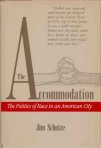Tomorrow, I will present my synopsis of The Accommodation: The Politics of Race in an American City by Jim Schutze. If you live in Dallas, you might know Mr. Schutze and his work. He is the “angry old white guy with a shotgun.” Here are his pictures that he includes in his column on the Dallas Observer blog, Unfair Park.
The Accommodation is a – how do I say this? – “must read.” But it will cost you. The least expensive used copy this morning on Amazon is $69.00. You can buy a new copy for the bargain price of $581.30. So, yes, it is out of print, and yes, not all that many are clamoring to read it. That is a mistake. They should clamor to read it. It ought to be reprinted, reissued. (Jim, put it out in a Kindle version).
I speak twice a month at the CitySquare sponsored Urban Engagement Book Club, and these books deal with issues of social justice, race, poverty. Mr. Schutze will attend tomorrow, along with Reverend Peter Johnson – they will lead a discussion after my synopsis. Mr. Schutze, the reporter, and Rev. Johnson, the long-time activist. In a city that never quite made its full peace with its racial issues, their voices still need to be heard clearly.
Though the book takes us from the years just after the Civil war, and includes enough detail about the bigger national picture of the struggle for basic human rights for people of color to put the Dallas story into a broader context, its full treatment of what went on in Dallas is just utterly enlightening.
The violence never fully erupted in Dallas, like other cities, though there was still “plenty.” From the book:
The first explosion came in early February, 1950, at night, at the home of Horace Bonner, who had bought a house just a few blocks outside a black neighborhood near Exline Park. Bonner, 57, who worked for a printing company, was asleep inside. Also in the house were his wife and mother-in-law…”
And the premise of the book is that the business community (the only community that ever seemed to matter in Dallas) found ways to get the black leaders to accept “the accommodation.” The book is a tour-de-force on the ideas of “gradualism” and “tokenism.” (The words “accommodation” and “tokenism” are throughout the book; though I do not remember the word “gradualism” in the book, it is the concept that runs throughout the narrative).
It really does boil down to this: white people just had an enormously difficult time accepting the premise that black people were actually full human beings. The white folks did not want black people drinking from their water fountains, using the same toilets, going to the same churches, living next door,… and they sure as heck did not want a black boy dating their white daughters.
And so, the black people were kept out. Even after they had to “officially” let them in, the white folks still kept them out, in a multitude of ways. The white leaders would give a little, and then take it back – time and time again. Again, from the book, as desegregation steps were taken, earning the specific praise of President John F. Kennedy:
Superintendent W. T. White withdrew a promise that more black students would be allowed to transfer to white schools later in the term, making it plain on the very first day that what had been accomplished was tokenism and that the school district would countenance nothing more, no matter what promises had been made to avoid a riot.
Bombings; crosses burned on lawns; beatings; an unending stream of humiliations. Such went on for years/decades…
There are cowards, and villains, in the book. Quite a few white pastors do not come off looking very enlightened, or courageous. And there are heroes in the book. A couple of civic leaders; a few black pastors; Stanley Marcus. (If I had more money, I would go shop at Neiman Marcus just out of my new found appreciation for what Mr. Marcus did).
But, here’s the thing. The book came out in 1987. And I live in 2012. I see the lingering effects of racism, and the lingering effects of the decisions made in Dallas so long ago, so very often.
I think we all owe it to the people we live with to know this history. It might help us be a little more serious about what to do next…
—————-
A personal note: I do not know enough about our Dallas area history. This book has helped me immensely. If you live in Dallas, track this book down. Surely it is in the library near you. And, add to your reading list the terrific memoir by the Pulitzer Prize winning author Lawrence Wright: In the New World: Growing Up with America, 1960-1984. It is about the Dallas he grew up in, and it is a wonderful read! (apparently also out of print, but available on kindle).
—————-
If you are in the Dallas area, come join us for this session. Noon, tomorrow, October 18, 2012, at the First United Methodist Church, 1928 Ross Avenue, Dallas, 76201. Right downtown, in the arts district. (The church graciously lets CitySquare hold these sessions here the third Thursday of every month).

